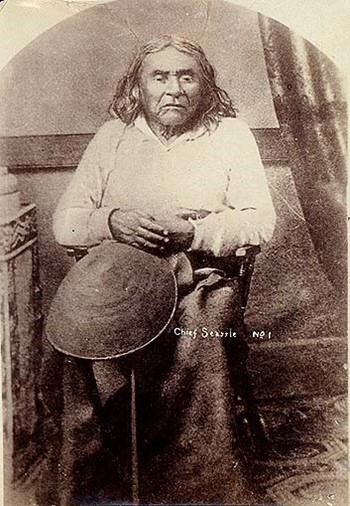
Destination stewardship is the continuous pursuit of a net positive tourism ecosystem that exists in alignment with shared community values. This means a positive tourism experience for visitors and residents alike.
There is a quote that has long been a favorite of mine. "We do not inherit the earth from our ancestors; we borrow it from our children."
A Google search of its origins will send you down numerous rabbit holes with arguments for many deserving people to whom the quote is attributed. As for myself, I would like to believe that it was spoken by Chief Seattle, or more properly known as Chief Si'ahl, who was a leader of the Suquamish and Duwamish tribes in what is now the Pacific Northwest region of the United States, specifically around modern Seattle, Washington, which was named after him. He lived from about 1786 to 1866.

Chief Si'ahl is best known for his eloquence in expressing his tribe's values, particularly regarding the environment and stewardship of the land. He is often credited with a famous speech in 1854, reportedly given during negotiations with the United States government regarding the surrender or sale of tribal lands. He is quoted as saying, "This we know; the earth does not belong to man; man belongs to the earth. We know that all things are connected, like the blood that unites a family. All things are connected.”
This view is at the heart of what I would call stewardship. And to me, there is nothing more noble than being a steward of the community, because it embodies the highest form of service, ensuring the well-being of the land and its people for generations to come. Being a steward of the community means putting the collective needs and health of the environment, culture, and economy ahead of individual gain. This role not only preserves the heritage and resources of one's surroundings, but also fosters a sense of unity, responsibility, and pride among its members. Through such stewardship, communities can thrive sustainably, maintain their uniqueness, and provide a place of belonging and growth for all.
This has shaped how we at Destinations International look at the necessary evolution of destination organizations from associations for community advancement to convention and visitor bureaus to destination marketing organizations to where they need to be – destination stewardship organizations. At the risk of refiring the argument, let me say that we have spent a great deal of time debating what the “M” stands for in DMO: marketing or management. Perhaps the problem is that it is not an “M” at all but instead an “S” for stewardship.

At Destinations International, we spend a great deal of time on definitions (as well as when to use them and when not to). The way we look at it, a common definition allows for standardization across different regions, cultures or sectors. This can be essential in a global industry such as travel and tourism, where a standardized definition helps to coordinate efforts and policies across borders, languages and time zones. This is particularly relevant in my work, where promoting the importance of destination organizations is linked to a clear articulation of their role and impact.
In that spirit, I would like to put forward our definition of destination stewardship: “Destination stewardship is the continuous pursuit of a net positive tourism ecosystem that exists in alignment with shared community values.” Simply stated, stewardship is a positive tourism experience for visitors and residents alike, and for current and future generations. Destination stewardship is explored and brought to life in this short video.
The future of travel does not exist without understanding what makes a place not only great to visit, but also to live, work, play and invest in. In a world where the only constant is change, how do we ensure that the destinations we represent, reside in and travel to are equipped to build vibrant and flourishing communities for generations to come? The answer lies in the industry’s transformative shift from destination marketing to destination stewardship. Taking a holistic, multi-stakeholder approach to a destination’s strategic planning and implementation, destination stewardship is aimed at improving the quality of all life—inclusive of humans and the natural habitats that surround us.
It is through this lens that destination stewardship becomes critical to social inclusion. In fact, it is one of the thirteen topics we encourage destinations to address with their communities. Using our Social Inclusion Framework, destinations can engage with residents, especially those underrepresented, to break down barriers and create a sense of belonging for all.
We did not come up with this definition in a vacuum. It was a consensus definition created by the Miles Partnership Global Stewardship Innovation Lab that led to the creation of the Wayfinder Stewardship Strategic Planning Tool. The lab brought together a wide range of thought leaders, researchers and stewardship practitioners across destination marketing, management and the wider tourism industry. Its goal was to define destination stewardship and ground the Wayfinder in global best practices. You can learn more by viewing the on-demand webinar, Destination Stewardship - The Future of Destination Management.
As a result, the Wayfinder is an industry-led destination management tool enabling destination organizations to measure, monitor and improve destination stewardship capability and outcomes. Based on global best practices, the tool’s framework provides a clear path and actionable insights for destination organizations to develop strategic plans that benefit residents and visitors alike.
But whether you use the tool or not, we hope that the definition of stewardship – that destination stewardship is the continuous pursuit of a net positive tourism ecosystem that exists in alignment with shared community values – is a definition we can all rally around. This is important not only as we chart the evolution of the destination organization, but as we explain the role, essential nature and public good that destination organizations represent.
Submit Your Thought Leadership

Share your thought leadership with the Destinations International team! Learn how to submit a case study, blog or other piece of content to DI.


